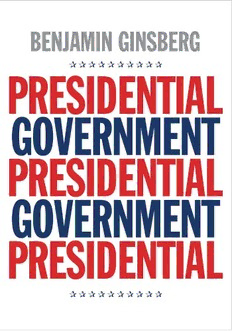
Presidential government PDF
Preview Presidential government
Presidential Government This page intentionally left blank Presidential Government Benjamin Ginsberg New Haven and London Published with assistance from the Joan Patterson Kerr Fund. Published with assistance from the Louis Stern Memorial Fund. Copyright © 2016 by Benjamin Ginsberg. All rights reserved. This book may not be reproduced, in whole or in part, including illustrations, in any form (beyond that copying permitted by Sections 107 and 108 of the U.S. Copyright Law and except by reviewers for the public press), without written permission from the publishers. Yale University Press books may be purchased in quantity for educational, business, or promotional use. For information, please e-mail [email protected] (U.S. office) or [email protected] (U.K. office). Set in Garamond type by Integrated Publishing Solutions, Grand Rapids, Michigan. Printed in the United States of America. ISBN 978-0-300-21206-8 (paperback: alk. paper) Library of Congress Control Number: 2015950946 A catalogue record for this book is available from the British Library. This paper meets the requirements of ANSI/NISO Z39.48–1992 (Permanence of Paper). 10 9 8 7 6 5 4 3 2 1 For Sandy This page intentionally left blank Contents Preface ix one. What Is an Executive, and Why Do We Need One? 1 two. The Constitutional Foundations of Presidential Power 18 three. A Brief History of the Presidency 59 four. Presidential Elections 103 five. The Executive Branch 160 six. The President, the Congress, and Domestic Policy 193 seven. Presidential Policy Tools 231 eight. The Executive and the Courts 280 nine. Foreign Policy and National Security 323 ten. Understanding the Presidency as an Institution: Advice for Citizens and Voters 391 Appendix: Gallery of Presidents 401 Notes 407 For Further Reading 449 Illustration Credits 455 Index 459 This page intentionally left blank Preface F or most of the nineteenth century, the presidency was a weak insti- tution. In unusual circumstances, a Jefferson, a Jackson, or a Lincoln might exercise extraordinary power, but most presidents held little influence over the congressional barons or provincial chieftains who ac tu a lly steered the government. The president’s job was to execute policy, ra re ly t o make it. Policymaking was the responsibility of legislators, particu- la rl y th e leaders of the House and Senate. Today, the presidency has become the dominant force in national policy for- mation. Not all domestic policy springs from the White House, but none is made without the president’s involvement. And when it comes to foreign policy and par- ticularly security policy, there can be little doubt about presidential primacy. Con- gress retains the constitutional power to declare war, but that power has not been exercised in sixty-five years. During this period American military forces have been engaged in numerous conflicts all over the world at the behest of the president. How did this transformation come about? To some, the study of the presi- dency is chiefly the study of personality and leadership in an attempt to distinguish between the attributes and conduct of strong and weak presidents—or great, near- great, and not-so-great presidents. Richard Neustadt, an influential presidential scholar, epitomized this focus on leadership styles and personality when he declared in 1960 that presidential power was the “power to persuade.” In other words, the power of the presidency was derived from the charisma of the president. Some scholars pushed this personalistic approach even further by engaging in psychoanalytic studies of presidents to determine which personality attributes seemed to be associated with presidential success. James David Barber’s well-known book The Presidential Character is an exemplar of this school of thought. ix
